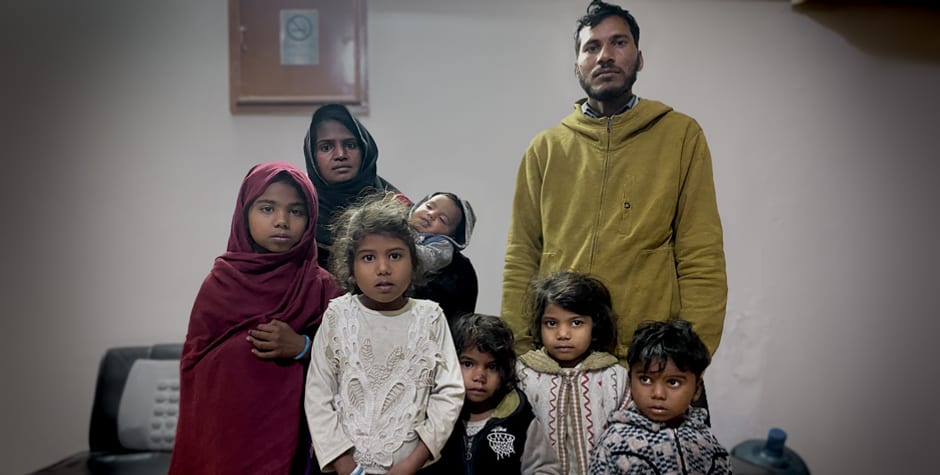Pakistani Affiliate Rescues Another Christian Family From Bonded Labor
The Organization for Legal Aid (OLA), our Pakistani affiliate, has again secured a victory for poor Pakistani Christians who have been forced into bonded labor.
In this case, the victims of this illegal, yet persistent, practice of bonded labor were a Christian family: Abbas Masih, his wife (Gulshan), and their six children.
Abbas’ brother, Javed, worked on a cattle farm for a Muslim man named Riffat Ahmad. While working there, Javed took a loan of four hundred thousand rupees (roughly $2,250) from Riffat. About two years ago, Javed became sick and died. After Javed’s death, Riffat abducted Abbas and his family and forced them to work as substitutes for Javed in order to pay off the loan. Abbas was forced to work long hours in the fields and as a cattle keeper, while Gulshan worked as a maid at Riffat’s house. Riffat refused to pay Abbas and his wife for their work. He also prevented Abbas from leaving the house and often physically assaulted him.
Finally, on February 1, 2022, Gulshan fled with three of the children from Riffat’s house, but Abbas and the other three children remained there. Gulshan came to our affiliate office in Pakistan and shared her story. Our affiliate acted quickly and filed a habeas corpus petition with the Lahore High Court for the recovery, production, and release of Abbas and the remaining children.
In response, the court ordered the local police to rescue Abbas and the three children. When the police raided Riffat’s place, they found Abbas working at the farm. They gathered Abbas and his three children, removed them from the farm, and presented them before the court the next day. In court, Riffat’s lawyer argued that Riffat’s actions had been legal because there was a current and unpaid loan. However, our lawyer intervened and told the judge that such loans are expressly prohibited under the Bonded Labour Act. Riffat’s attorney had no response to the law that clearly made his client’s actions unlawful, and the judge ordered that Abbas and the children be set free.
In Pakistan, many people in the poorer communities, especially Christians, are forced into bonded labor. As I discussed in my previous posts (here and here), bonded labor entails an employer giving a small loan, or wage advance (peshgi), to an employee when hired and then routinely deducting from the employee’s salary to pay off the loan. The problem is that these aren’t typical loans, and employers in such cases are habitually dishonest. Generally, the employer has a position of great power over the employee, and the employee is poor and uneducated. As a result, the employee is most often indebted for a long period of time, with the “loan” sometimes extending to family members.
While the Constitution of Pakistan prohibited bonded labor, until 30 years ago, there were no statutory or procedural mechanisms providing punishment and remedies. This changed in 1992 when the Parliament of Pakistan passed the Bonded Labour System (Abolition) Act.
The Act discharged all existing bonded debts and outlawed any act of forced labor (Section 4). Moreover, anyone who violates this Act by compelling bonded labor can be “punish[ed] with imprisonment for a term which shall not be less than two years nor more than five years, or with fine which shall not be less than fifty thousand rupees, or with both” (Section 11). Practices, agreements, traditions, and other things of such effect that require any person, or a family member, to work as a bonded laborer are rendered “void and inoperative” (Section 5); they will not be enforced (Section 11, 12).
Any obligation to repay a bonded debt is extinguished by the Act, and nothing can be done by a creditor to recover a bonded debt (Section 6). For bonded debts deemed extinguished, the Act prohibits a creditor from even accepting a bonded laborer’s payment (Section 8). If he does, he is “punishable with imprisonment . . . or with fine” (Section 8). On top of that, the court may order him to deposit the amount he accepted so it can be refunded to the laborer (Section 8). Even if both parties have consented to a bonded labor arrangement, it is not enforceable. When an offense under this Act has been perpetrated, “A Magistrate of the first class empowered in this behalf by the Provincial Government” may try it “summarily” (Section 16(1-2)).
This is the law our affiliate attorney brought to the court’s attention, and it is why Riffat’s attorney had no response. The law clearly applies to Abbas and his family – especially because Abbas and his family were abducted to “pay off” another person’s “debt.”
When Abbas’ wife, Gulshan, first came to our affiliate office with three of their children seeking help, they were all very frightened – especially because Abbas and the other three children were still trapped in a threatening situation. But, two days later when Abbas and the other siblings were rescued and brought to the office, Gulshan and the children were clearly relieved and had big smiles on their faces. Abbas and his wife thanked the ACLJ, and its supporters, letting them know how grateful they are for the continued prayers and support.
With Abbas, his family, and many others free from bonded labor, our team is now looking at avenues that might allow these forced laborers to sue for back-wages.
